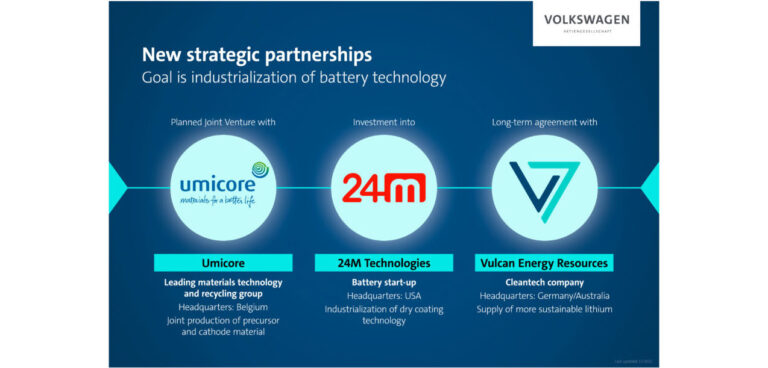The Volkswagen Group has entered three strategic partnerships, which it states further strengthen its position in the field of battery supply and manufacture. Its new partners are materials technology group Umicore, battery specialist 24M Technologies and cleantech company Vulcan Energy Resources.
VW notes that although these three partnerships are independent from each other, they share a common goal: the industrialization of battery technology and the volume production of more sustainable, cutting-edge batteries.
Thomas Schmall, member of the board of management of Volkswagen Group for technology and CEO of Volkswagen Group Components, commented, “Volkswagen is implementing its battery strategy very consistently and at a high pace. Volkswagen’s unified cell must be at the forefront of performance, costs and sustainability right from the start. With our new partners, we are one step closer to reaching this goal. Together, we will focus on key parts of the battery value chain and develop cutting-edge technologies.”
VW and Umicore plan to establish a joint venture to supply the former’s European cell factories with cathode materials. The intention is to gradually ramp up the JV’s production capacity, starting in 2025 with initial production of 20GWh for the Volkswagen gigafactory in Salzgitter, Germany. The ultimate goal is to reach annual production capacity of up to 160GWh by the end of the decade or, in other words, an annual production capacity to power approximately 2,200,000 BEVs.
“We are very pleased to become a long-term partner for Volkswagen in achieving its ambitious e-mobility strategy in Europe and in bringing our long-standing and proven expertise in rechargeable battery materials to this unique joint venture,” said Mathias Miedreich, CEO of Umicore. “The complementarity of our extensive technology, innovation and industrial know-how, will provide a strong framework to develop next-generation battery material technologies, giving us a considerable first-mover advantage in this fast-growing market.”
In order to develop production technology for its cell plants, VW is also investing in Cambridge, Massachusetts-based battery startup 24M, a spin-off from the Massachusetts Institute of Technology (MIT). The goal is to industrialize 24M’s technology, a semi-solid electrode coating process that is claimed to be an improvement over current dry coating processes.
If successful, this will, VW hopes, lead to a reduction in material usage and eliminate several steps from the conventional production process. For this purpose, a new Volkswagen-owned subsidiary will further develop and upscale the technology for automotive applications based on 24M’s IPs.
VW says that potential benefits of the tie-up include up to 40% less production area, considerable savings on investment and more efficient product recycling, as well as the reduction of the CO2 footprint of battery production. Implementing the process in large-scale production is targeted for the second half of the decade.
Finally, VW and Vulcan Energy Resources (which also recently agreed a deal with Renault) have signed an agreement regarding the supply of CO2-neutral lithium from the Upper Rhine Valley in Germany. The binding contract focuses on providing lithium hydroxide over a period of five years starting 2026. The product will contribute to securing Volkswagen demand for future in-house cell production both in Germany and Europe. Further aspects of a possible strategic partnership are under negotiation.
Vulcan is currently developing a project to produce CO2-free lithium in the Upper Rhine Valley using a local and lithium-rich geothermal brine. Its Zero Carbon Lithium project aims to establish a sustainable and regional source of lithium from Europe’s largest deposit. The production process does not require fossil fuels or evaporation ponds.


